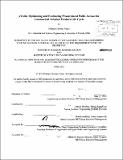| dc.contributor.advisor | Daniel Whitney and Don Rosenfield. | en_US |
| dc.contributor.author | Vento, Michael Thomas | en_US |
| dc.contributor.other | Leaders for Global Operations Program. | en_US |
| dc.date.accessioned | 2012-09-27T15:29:19Z | |
| dc.date.available | 2012-09-27T15:29:19Z | |
| dc.date.copyright | 2012 | en_US |
| dc.date.issued | 2012 | en_US |
| dc.identifier.uri | http://hdl.handle.net/1721.1/73399 | |
| dc.description | Thesis (M.B.A.)--Massachusetts Institute of Technology, Sloan School of Management; and, (S.M.)--Massachusetts Institute of Technology, Engineering Systems Division; in conjunction with the Leaders for Global Operations Program at MIT, 2012. | en_US |
| dc.description | Cataloged from PDF version of thesis. | en_US |
| dc.description | Includes bibliographical references (p. 77-78). | en_US |
| dc.description.abstract | Spirit AeroSystems is engaged in an unprecedented collaboration to supply a composite fuselage section for a new aircraft program. In most cases, Spirit cannot effectively leverage its composite sourcing experience with other customers due to differences in material and design. Management of Spirit's global supply chain represents a major opportunity by which cost savings can be achieved, particularly in the initial stages before investment recovery. This is augmented by the fact that engineering design changes are prevalent in early-ramp due to a concurrent emphasis on mass reduction. If a supplier cannot quickly and accurately adapt to design changes on critical-path parts, the resulting delays in production capability can cripple a program. As the aircraft ramps to full production, strategic points emerge when sourcing contracts can be re-negotiated or change/add parties. This internship sought to identify, qualitatively and quantitatively through utility theory, the optimal sourcing targets for each part. It theorized that, at each stage of the product life cycle and dependent on each material classification (commodity vs metal type vs composite type), a trade-off exists between Total Landed Cost and risk elements that can be optimized. Based on the nature of the commercial aviation industry, critical risk elements were segregated logically between engineering (technological capability), performance (production and delivery), and global (financial and geopolitical) risk. Efforts were then achieved through the design and development of a Decision Support System (DSS), titled a Voilà - a combination of the French 'avion (aircraft) and 'voilà' (behold). Procurement teams are asked to work with suppliers to obtain metrics and survey data as model inputs, resulting in measures of utility for each risk element and cost. The DSS utilizes nonlinear programming to produce a sourcing mix (among up to 10 suppliers) with optimal utility. Finally, a methodology for data-driven continuous improvement of decision knowledge is outlined, incorporating risk-inclusive estimations of Total Cost of Ownership. Development primarily occurred within the framework of Spirit's French final assembly facility and its supply-base. aVoilà was met with favorable response when presented to Supply Chain Management senior staff at Spirit headquarters in Wichita, KS. The prospect of improved standardization and control among supplier selection criteria is desirable. The model's ability to deliver scenario analysis could provide Spirit a baseline to negotiate with - asking a supplier to adjust contractual demands or invest in new technology in order to win business can be justified by a utility improvement. | en_US |
| dc.description.statementofresponsibility | by Michael Thomas Vento. | en_US |
| dc.format.extent | 78 p. | en_US |
| dc.language.iso | eng | en_US |
| dc.publisher | Massachusetts Institute of Technology | en_US |
| dc.rights | M.I.T. theses are protected by
copyright. They may be viewed from this source for any purpose, but
reproduction or distribution in any format is prohibited without written
permission. See provided URL for inquiries about permission. | en_US |
| dc.rights.uri | http://dspace.mit.edu/handle/1721.1/7582 | en_US |
| dc.subject | Sloan School of Management. | en_US |
| dc.subject | Engineering Systems Division. | en_US |
| dc.subject | Leaders for Global Operations Program. | en_US |
| dc.title | aVoilà : optimizing and evaluating procurement paths across the commercial aviation product life cycle | en_US |
| dc.title.alternative | Optimizing and evaluating procurement paths across the commercial aviation product life cycle | en_US |
| dc.type | Thesis | en_US |
| dc.description.degree | S.M. | en_US |
| dc.description.degree | M.B.A. | en_US |
| dc.contributor.department | Leaders for Global Operations Program at MIT | en_US |
| dc.contributor.department | Massachusetts Institute of Technology. Engineering Systems Division | |
| dc.contributor.department | Sloan School of Management | |
| dc.identifier.oclc | 810135676 | en_US |
